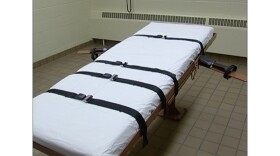COVID-19 closed down the March primary election, and lawmakers extended the absentee ballot deadline to late April. Voter rights groups are asking state lawmakers to reform voting laws now, to avoid confusion before the November election. But they are not necessarily on the same page when it comes to which reforms should be made.
There is bipartisan legislation pending before Ohio lawmakers that would make changes to the voting process. It calls for simplification and consolidation. But that last point concerns David Pepper, Chair of the Ohio Democratic Party.
“Consolidation is a red flag for much more crowded polling places and long lines," Pepper says.

Pepper fears there won’t be enough voting machines at enough polling places, a problem that led to many minority voters and students being unable to cast ballots in the 2004 election. Pepper says changes made after that mandated ratios for electronic machines based on the number of voters. Now, he fears the legislation being considered will undo that ratio requirement.
The ACLU of Ohio’s Gary Daniels says his group has worked with other voter rights groups to come up with recommendations they’ve sent to Ohio’s leaders. Daniels says the group wants to insure any legislative reforms make it easier, not harder, to vote.
“One of them is to make sure voters have ballots sent to them postage paid so that they don’t have to first request those, then wait for them to get sent to them then fill it out and send it back because what we found in the primary is that was a cumbersome, time consuming process," Daniels says.
Jen Miller, the Executive Director of the Ohio League of Women Voters, says she doesn't see that happening. But she’s not against that idea but she says there are changes that could make the process easier.
“Everyone gets an application. Pre-paid postage for the application and the ballot. Also, you can apply online. We do want both of those," Miller says.

And those provisions are included that bill. But Aaron Ockerman, President of the Ohio Association of Election Officials, says the legislation does seek to change the deadline for requesting a ballot.
“There’s an element in Ohio law that allows people to request an absentee ballot all of the way up until Saturday before the election and if you request a ballot that late in the game, the post office, on a good day, is not going to get you your ballot in time to vote it," Ockerman says.
For the extended March primary, many Ohioans dropped their ballots at boards of elections because the ballots arrived too late to be returned. And Ockerman says the new bill that calls for consolidation would not increase lines.
"Really what we are trying to do is utilize spaces that are going to be more conducive for social distancing. So we are not going to be able to vote in nursing homes and places like that as we have in the past. So what we are really looking for is high school gymnasiums, or shopping malls where people can really spread out. That’s the kind of thing we are talking about. So, what we have asked the legislature to do is free us up to be able to utilize those spaces," Ockerman says.
Ockerman says the ratios on electronic machines are archaic because most counties are now using optical scan machines anyway.
Any reforms under consideration will need to pass the legislature soon. Ohio lawmakers will break for the summer in June and are not expected to come back before November.







